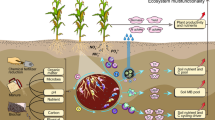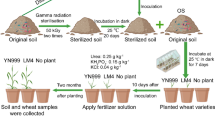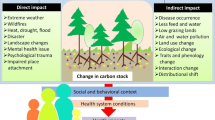Abstract
Purpose
Wetland soils may face more severe water stress under future climate change. Our aim was to assess the change characteristics of wetland soil bacterial community and metabolic potentials under drought and flood conditions.
Methods
Wetland soil was incubated under five different water environments (including constant moisture at 30%, natural air-dried, and 3 types of flooding depths) by conducting experimental microcosms. After 1, 21, and 132 days of incubation, the soil bacterial community structure and metabolic potential were examined by the 16S rRNA gene sequencing and Biolog-Ecoplates method, respectively.
Results
The results showed that Actinobacteria and Firmicutes were significantly enriched under drought and flooding treatments, respectively. Compared to flooding, drought decreased soil microbial biomass and carbon metabolism more severely. However, the depth of flooding did not significantly change bacterial community composition and carbon metabolism. In addition, the responses of soil metabolic functions to drought were more sensitive than the change of bacterial community composition. When the wetland soil faced water stress (drought and flooding), its metabolic functions showed close correlations with bacterial community composition and were negatively affected by most of environmental factors (such as pH, NO3-N, and NH4-N).
Conclusions
The results indicate that the drying condition is more severe and rapid than flooding in threatening soil microbial metabolic activity. In addition, the depth of flooding does not significantly change bacterial community composition and carbon metabolism.





Similar content being viewed by others
References
Abbaspour M, Javid AH, Mirbagheri SA, Ahmadi Givi F, Moghimi P (2012) Investigation of lake drying attributed to climate change. Int J Environ Sci Technol 9:257–266. https://doi.org/10.1007/s13762-012-0031-0
Acosta-Martínez V, Cotton J, Gardner T, Moore-Kucera J, Zak J, Wester D, Cox S (2014) Predominant bacterial and fungal assemblages in agricultural soils during a record drought/heat wave and linkages to enzyme activities of biogeochemical cycling. Appl Soil Ecol 84:69–82. https://doi.org/10.1016/j.apsoil.2014.06.005
Allison SD, Martiny JB (2008) Resistance, resilience, and redundancy in microbial communities. Proc Natl Acad Sci U S A 105:11512–11519. https://doi.org/10.1073/pnas.0801925105
Arheimer B, Wittgren HB (2002) Modelling nitrogen removal in potential wetlands at the catchment scale. Ecol Eng 19:63–80. https://doi.org/10.1016/S0925-8574(02)00034-4
Arnell NW, Gosling SN (2016) The impacts of climate change on river flood risk at the global scale. Clim Chang 134:387–401. https://doi.org/10.1007/s10584-014-1084-5
Awasthi A, Singh M, Soni SK, Singh R, Kalra A (2014) Biodiversity acts as insurance of productivity of bacterial communities under abiotic perturbations. ISME J 8:2445–2452. https://doi.org/10.1038/ismej.2014.91
Barnard RL, Osborne CA, Firestone MK (2013) Responses of soil bacterial and fungal communities to extreme desiccation and rewetting. ISME J 7:2229–2241. https://doi.org/10.1038/ismej.2013.104
Bell CW, Acosta-Martinez V, McIntyre NE, Cox S, Tissue DT, Zak JC (2009) Linking microbial community structure and function to seasonal differences in soil moisture and temperature in a Chihuahuan desert grassland. Microb Ecol 58:827–842. https://doi.org/10.1007/s00248-009-9529-5
Bhattacharyya P, Roy K, Neogi S, Adhya T, Rao K, Manna M (2012) Effects of rice straw and nitrogen fertilization on greenhouse gas emissions and carbon storage in tropical flooded soil planted with rice. Soil Tillage Res 124:119–130. https://doi.org/10.1016/j.still.2012.05.015
Bolger AM, Lohse M, Usadel B (2014) Trimmomatic: a flexible trimmer for Illumina sequence data. Bioinformatics 30:2114–2120. https://doi.org/10.1093/bioinformatics/btu170
Borowik A, Wyszkowska J (2016) Soil moisture as a factor affecting the microbiological and biochemical activity of soil. Plant Soil Environ 62:250–255. https://doi.org/10.17221/158/2016-PSE
Bouskill NJ, Wood TE, Baran R, Hao Z, Ye Z, Bowen BP, Lim HC, Nico PS, Holman HY, Gilbert B, Silver WL, Northen TR, Brodie EL (2016) Belowground response to drought in a tropical forest soil. II. Change in microbial function impacts carbon composition. Front Microbiol 7:323. https://doi.org/10.3389/fmicb.2016.00323
Bryant JA, Stewart FJ, Eppley JM, DeLong EF (2012) Microbial community phylogenetic and trait diversity declines with depth in a marine oxygen minimum zone. Ecology 93:1659–1673. https://doi.org/10.1890/11-1204.1
Christian BW, Lind OT (2007) Multiple carbon substrate utilization by bacteria at the sediment–water interface: seasonal patterns in a stratified eutrophic reservoir. Hydrobiologia 586:43–56. https://doi.org/10.1007/s10750-006-0476-6
Cockburn DW, Koropatkin NM (2016) Polysaccharide degradation by the intestinal microbiota and its influence on human health and disease. J Mol Biol 428:3230–3252. https://doi.org/10.1016/j.jmb.2016.06.021
Cole JR, Chai B, Farris RJ, Wang Q, Kulam SA, Mcgarrell DM, Garrity GM, Tiedje JM (2005) The Ribosomal Database Project (RDP-II): sequences and tools for high-throughput rRNA analysis. Nucleic Acids Res 33:294–296. https://doi.org/10.1093/nar/gki038
Comte J, Fauteux L, Del Giorgio PA (2013) Links between metabolic plasticity and functional redundancy in freshwater bacterioplankton communities. Front Microbiol 4:112. https://doi.org/10.3389/fmicb.2013.00112
Dassonville F, Renault P (2002) Interactions between microbial processes and geochemical transformations under anaerobic conditions: a review. Agronomie 22:51–68. https://doi.org/10.1051/agro:2001001
Delgado-Baquerizo M, Fernando T, Reich PB, Jeffries TC, Gaitan JJ, Encinar D, Berdugo M, Campbell CD, Singh BK (2016) Microbial diversity drives multifunctionality in terrestrial ecosystems. Nat Commun 7:10541. https://doi.org/10.1038/ncomms10541
Deng L, Peng CH, Kim DG, Li JW, Liu YL, Hai XY, Liu QY, Huang CB, Shangguan ZP, Kuzyakov Y (2020) Drought effects on soil carbon and nitrogen dynamics in global natural ecosystems: a meta-analysis. Earth-Sci Rev:103501. https://doi.org/10.1016/j.earscirev.2020.103501
Dronova I, Gong P, Wang L, Zhong L (2015) Mapping dynamic cover types in a large seasonally flooded wetland using extended principal component analysis and object-based classification. Remote Sens Environ 158:193–206. https://doi.org/10.1016/j.rse.2014.10.027
Duan YL, Wu FS, Wang WF, He DP, Gu JD, Feng HY, Chen T, Liu GX, An LZ (2017) The microbial community characteristics of ancient painted sculptures in Maijishan Grottoes, China. PLoS One 12:e0183598. https://doi.org/10.1371/journal.pone.0179718
Fierer N, Schimel J, Holden P (2003) Influence of drying–rewetting frequency on soil bacterial community structure. Microb Ecol 45:63–71. https://doi.org/10.1007/s00248-002-1007-2
Fuhrman JA (2009) Microbial community structure and its functional implications. Nature 459:193–199. https://doi.org/10.1038/nature08058
Gionchetta G, Oliva F, Romaní AM, Bañeras L (2020) Hydrological variations shape diversity and functional responses of streambed microbes. Sci Total Environ 714:136838. https://doi.org/10.1016/j.scitotenv.2020.136838
Grayston SJ, Campbell CD, Bardgett RD, Mawdsley JL, Clegg CD, Ritz K, Griffiths BS, Rodwell JS, Edwards SJ, Davies WJ, Elston DJ, Millard P (2004) Assessing shifts in microbial community structure across a range of grasslands of differing management intensity using CLPP, PLFA and community DNA techniques. Appl Soil Ecol 25:63–84. https://doi.org/10.1016/S0929-1393(03)00098-2
Griffiths RI, Whiteley AS, O'Donnell AG, Bailey MJ (2003) Physiological and community responses of established grassland bacterial populations to water stress. Appl Environ Microbiol 69:6961–6968. https://doi.org/10.1128/AEM.69.12.6961-6968.2003
Hannula SE, Morriën E, de Hollander M, Van Der Putten WH, van Veen JA, De Boer W (2017) Shifts in rhizosphere fungal community during secondary succession following abandonment from agriculture. ISME J 11:2294–2304. https://doi.org/10.1038/ismej.2017.90
Hawkes CV, Keitt TH (2015) Resilience vs. historical contingency in microbial responses to environmental change. Ecol Lett 18:612–625. https://doi.org/10.1111/ele.12451
Herzog M, Striker GG, Colmer TD, Pedersen O (2016) Mechanisms of waterlogging tolerance in wheat–a review of root and shoot physiology. Plant Cell Environ 39:1068–1086. https://doi.org/10.1111/pce.12676
Hong C, Si Y, Xing Y, Li Y (2015) Illumina MiSeq sequencing investigation on the contrasting soil bacterial community structures in different iron mining areas. Environ Sci Pollut Res 22:10788–10799. https://doi.org/10.1007/s11356-015-4186-3
Hu QY, Li M, Wang C, Ji M (2015) Influence of powdered activated carbon addition on water quality, sludge properties, and microbial characteristics in the biological treatment of commingled industrial wastewater. J Hazard Mater 295:1–8. https://doi.org/10.1016/j.jhazmat.2015.03.070
Huang L, Hu W, Tao J, Liu Y, Kong Z, Wu L (2019) Soil bacterial community structure and extracellular enzyme activities under different land use types in a long-term reclaimed wetland. J Soils Sediments 19:2543–2557. https://doi.org/10.1007/s11368-019-02262-1
Hueso S, García C, Hernández T (2012) Severe drought conditions modify the microbial community structure, size and activity in amended and unamended soils. Soil Biol Biochem 50:167–173. https://doi.org/10.1016/j.soilbio.2012.03.026
Keller PS, Catalán N, von Schiller D, Grossart HP, Koschorreck M, Obrador B, Frassl MA, Karakaya N, Barros N, Howitt JA, Mendoza-Lera C, Pastor A, Flaim G, Aben R, Riis T, Arce MI, Onandia G, Paranaíba JR, Linkhorst A, del Campo R, Amado AM, Cauvy-Fraunié S, Brothers S, Condon J, Mendonça RF, Reverey F, Rõõm EI, Datry T, Roland F, Laas A, Obertegger U, Park JH, Wang H, Kosten S, Gómez R, Feijoó C, Elosegi A, Sánchez-Montoya MM, Finlayson CM, Melita M, Oliveira Junior ES, Muniz CC, Gómez-Gener L, Leigh C, Zhang Q, Marcé R (2020) Global CO2 emissions from dry inland waters share common drivers across ecosystems. Nat Commun 11:2126. https://doi.org/10.1038/s41467-020-15929-y
Kour R, Patel N, Krishna AP (2016) Climate and hydrological models to assess the impact of climate change on hydrological regime: a review. Arab J Geosci 9:1–31. https://doi.org/10.1007/s12517-016-2561-0
Kroes DE, Schenk ER, Noe GB, Benthem AJ (2015) Sediment and nutrient trapping as a result of a temporary Mississippi River floodplain restoration: the Morganza Spillway during the 2011 Mississippi River Flood. Ecol Eng 82:91–102. https://doi.org/10.1016/j.ecoleng.2015.04.056
Krzmarzick MJ, Crary BB, Harding JJ, Oyerinde OO, Leri AC, Myneni SC, Novak PJ (2012) Natural niche for organohalide-respiring Chloroflexi. Appl Environ Microbiol 78:393–401. https://doi.org/10.1128/AEM.06510-11
Lansdown K, Mckew BA, Whitby C, Heppell CM, Dumbrell AJ, Binley A, Olde L, Trimmer M (2016) Importance and controls of anaerobic ammonium oxidation influenced by riverbed geology. Nat Geosci 9:357–360. https://doi.org/10.1038/ngeo2684
Lee HJ, Jeong SE, Kim PJ, Madsen EL, Jeon CO (2015) High resolution depth distribution of Bacteria, Archaea, methanotrophs, and methanogens in the bulk and rhizosphere soils of a flooded rice paddy. Front Microbiol 6:639. https://doi.org/10.3389/fmicb.2015.00639
Lennon JT, Jones SE (2011) Microbial seed banks: the ecological and evolutionary implications of dormancy. Nat Rev Microbiol 9:119–130. https://doi.org/10.1038/nrmicro2504
Lennon JT, Aanderud ZT, Lehmkuhl B, Schoolmaster DR (2012) Mapping the niche space of soil microorganisms using taxonomy and traits. Ecology 93:1867–1879. https://doi.org/10.1890/11-1745.1
Liu K, Liu Y, Jiao N, Zhu L, Wang J, Hu A, Liu X (2016) Vertical variation of bacterial community in Nam Co, a large stratified lake in central Tibetan Plateau. Antonie Van Leeuwenhoek 109:1323–1335. https://doi.org/10.1007/s10482-016-0731-4
Ma YT, Li JQ, Wu J, Kong ZY, Wu L (2018) Bacterial and fungal community composition and functional activity associated with lake wetland water level gradients. Sci Rep 8:760. https://doi.org/10.1038/s41598-018-19153-z
Magoč T, Salzberg SL (2011) FLASH: fast length adjustment of short reads to improve genome assemblies. Bioinformatics 27:2957–2963. https://doi.org/10.1093/bioinformatics/btr507
Malik AA, Swenson T, Weihe C, Morrison EW, Martiny JBH, Brodie EL, Northen TR, Allison SD (2020) Drought and plant litter chemistry alter microbial gene expression and metabolite production. ISME J 14:2236–2247. https://doi.org/10.1038/s41396-020-0683-6
Manzoni S, Schaeffer SM, Katul G, Porporato A, Schimel JP (2014) A theoretical analysis of microbial eco-physiological and diffusion limitations to carbon cycling in drying soils. Soil Biol Biochem 73:69–83. https://doi.org/10.1016/j.soilbio.2014.02.008
Meisner A, Leizeaga A, Rousk J, Bååth E (2017) Partial drying accelerates bacterial growth recovery to rewetting. Soil Biol Biochem 112:269–276. https://doi.org/10.1016/j.soilbio.2017.05.016
Neatrour MA, Webster JR, Benfield EF (2004) The role of floods in particulate organic matter dynamics of a southern Appalachian river–floodplain ecosystem. J N Am Benthol Soc 23:198–213. https://doi.org/10.1899/0887-3593(2004)023<0198:TROFIP>2.0.CO;2
Nguyen LT, Osanai Y, Anderson IC, Bange MP, Tissue DT, Singh BK (2018a) Flooding and prolonged drought have differential legacy impacts on soil nitrogen cycling, microbial communities and plant productivity. Plant Soil 431:371–387. https://doi.org/10.1007/s11104-018-3774-7
Nguyen LTT, Osanai Y, Lai K, Anderson IC, Bange MP, Tissue DT, Singh BK (2018b) Responses of the soil microbial community to nitrogen fertilizer regimes and historical exposure to extreme weather events: flooding or prolonged-drought. Soil Biol Biochem 118:227–236. https://doi.org/10.1016/j.soilbio.2017.12.016
Oest A, Alsaffar A, Fenner M, Azzopardi D, Tiquia-Arashiro SM (2018) Patterns of change in metabolic capabilities of sediment microbial communities in river and lake ecosystems. Int J Microbiol 2018:1–15. https://doi.org/10.1155/2018/6234931
Patrick D, Schloss SL, WestcottTR JR, Hall MH, Emily B, Hollister RA, Lesniewski BB, Oakley DH, Parks CJ, Robinson JW, Sahl BS, Gerhard G, Thallinger DJ, Van HCF, Weber (2009) Introducing mothur: open-source, platform-independent, community-supported software for describing and comparing microbial communities. Appl Environ Microbiol 75:7537–7541. https://doi.org/10.1128/AEM.01541-09
Randle-Boggis RJ, Ashton PD, Helgason T (2018) Increasing flooding frequency alters soil microbial communities and functions under laboratory conditions. MicrobiologyOpen 7:e548. https://doi.org/10.1002/mbo3.548
Reim A, Hernández M, Klose M, Chidthaisong A, Yuttitham M, Conrad R (2017) Response of methanogenic microbial communities to desiccation stress in flooded and rain-fed paddy soil from Thailand. Front Microbiol 8:785. https://doi.org/10.3389/fmicb.2017.00785
Riah-Anglet W, Trinsoutrot-Gattin I, Martin-Laurent F, Laroche-Ajzenberg E, Norini M-P, Latour X, Laval K (2015) Soil microbial community structure and function relationships: a heat stress experiment. Appl Soil Ecol 86:121–130. https://doi.org/10.1016/j.apsoil.2014.10.001
Risse-Buhl U, Schlief J, Mutz M (2015) Phagotrophic protists are a key component of microbial communities processing leaf litter under contrasting oxic conditions. Freshw Biol 60:2310–2322. https://doi.org/10.1111/fwb.12657
Robinson CJ, Bohannan BJM, Young VB (2010) From structure to function: the ecology of host-associated microbial communities. Microbiol Mol Biol Rev 74:453–476. https://doi.org/10.1128/MMBR.00014-10
Roudier P, Andersson JC, Donnelly C, Feyen L, Greuell W, Ludwig F (2016) Projections of future floods and hydrological droughts in Europe under a+2°C global warming. Clim Chang 135:341–355. https://doi.org/10.1007/s10584-015-1570-4
Sánchez-Rodríguez AR, Chadwick DR, Tatton GS, Hill PW, Jones DL (2018) Comparative effects of prolonged freshwater and saline flooding on nitrogen cycling in an agricultural soil. Appl Soil Ecol 125:56–70. https://doi.org/10.1016/j.apsoil.2017.11.022
Santacruz-Calvo L, González-López J, Manzanera M (2013) Arthrobacter siccitolerans sp. nov., a highly desiccation-tolerant, xeroprotectant-producing strain isolated from dry soil. Int J Syst Evol Microbiol 63(Pt 11):4174–4180. https://doi.org/10.1099/ijs.0.052902-0
Schaeffer SM, Homyak PM, Boot CM, Roux-Michollet D, Schimel JP (2017) Soil carbon and nitrogen dynamics throughout the summer drought in a California annual grassland. Soil Biol Biochem 115:54–62. https://doi.org/10.1016/j.soilbio.2017.08.009
Schimel J, Balser TC, Wallenstein M (2007) Microbial stress-response physiology and its implications for ecosystem function. Ecology 88:1386–1394. https://doi.org/10.1890/06-0219
Shen R, Lan Z, Huang X, Chen Y, Chen J (2020) Soil and plant characteristics during two hydrologically contrasting years at the lakeshore wetland of Poyang Lake, China. J Soils Sediments 20:3368–3379. https://doi.org/10.1007/s11368-020-02638-8
Sun L, Chen S, Chao L, Sun T (2007) Effects of flooding on changes in Eh, pH and speciation of cadmium and lead in contaminated soil. Bull Environ Contam Toxicol 79:514–518. https://doi.org/10.1007/s00128-007-9274-8
Taketani RG, Lançoni MD, Kavamura VN, Durrer A, Andreote FD, Melo IS (2017) Dry season constrains bacterial phylogenetic diversity in a semi-arid rhizosphere system. Microb Ecol 73:153–161. https://doi.org/10.1007/s00248-016-0835-4
Tong Y, Li J, Qi M, Zhang X, Wang M, Liu X, Zhang W, Wang X, Lu Y, Lin Y (2019) Impacts of water residence time on nitrogen budget of lakes and reservoirs. Sci Total Environ 646:75–83. https://doi.org/10.1016/j.scitotenv.2018.07.255
Traunspurger W, Höss S, Witthöft-Mühlmann A, Wessels M, Güde H (2012) Meiobenthic community patterns of oligotrophic and deep Lake Constance in relation to water depth and nutrients. Fundam Appl Limnol 180:233–248. https://doi.org/10.1127/1863-9135/2012/0144
Uhlířová E, Elhottova D, Třiska J, Šantrůčková H (2005) Physiology and microbial community structure in soil at extreme water content. Folia Microbiol 50:161–166. https://doi.org/10.1007/BF02931466
Unger IM, Motavalli PP, Muzika R-M (2009) Changes in soil chemical properties with flooding: a field laboratory approach. Agric Ecosyst Environ 131:105–110. https://doi.org/10.1016/j.agee.2008.09.013
Van Meeteren M, Tietema A, Van Loon E, Verstraten J (2008) Microbial dynamics and litter decomposition under a changed climate in a Dutch heathland. Appl Soil Ecol 38:119–127. https://doi.org/10.1016/j.apsoil.2007.09.006
Wang H, He Z, Lu Z, Zhou J, Van Nostrand JD, Xu X, Zhang Z (2012) Genetic linkage of soil carbon pools and microbial functions in subtropical freshwater wetlands in response to experimental warming. Appl Environ Microbiol 78:7652–7661. https://doi.org/10.1128/AEM.01602-12
Wang XL, Han JY, Xu LG, Wan RR, Chen YW (2014) Soil characteristics in relation to vegetation communities in the wetlands of Poyang Lake, China. Wetlands 34:829–839. https://doi.org/10.1007/s13157-014-0546-x
Williams MA (2007) Response of microbial communities to water stress in irrigated and drought-prone tallgrass prairie soils. Soil Biol Biochem 39:2750–2757. https://doi.org/10.1016/j.soilbio.2007.05.025
Wu J, Joergensen R, Pommerening B, Chaussod R, Brookes P (1990) Measurement of soil microbial biomass C by fumigation-extraction-an automated procedure. Soil Biol Biochem 22:1167–1169. https://doi.org/10.1016/0038-0717(90)90046-3
Wu K, Zhao W, Wang Q, Yang X, Zhu L, Shen J, Cheng X, Wang J (2019) The relative abundance of benthic bacterial phyla along a water-depth gradient in a Plateau Lake: physical, chemical, and biotic drivers. Front Microbiol 10:1521. https://doi.org/10.3389/fmicb.2019.01521
Yang H, Sheng R, Zhang Z, Wang L, Wang Q, Wei W (2016) Responses of nitrifying and denitrifying bacteria to flooding-drying cycles in flooded rice soil. Appl Soil Ecol 103:101–109. https://doi.org/10.1016/j.apsoil.2016.03.008
Yao S-H, Zhang B, Hu F (2011) Soil biophysical controls over rice straw decomposition and sequestration in soil: the effects of drying intensity and frequency of drying and wetting cycles. Soil Biol Biochem 43:590–599. https://doi.org/10.1016/j.soilbio.2010.11.027
Ye B, Chu Z, Wu A, Hou Z, Wang S (2018) Optimum water depth ranges of dominant submersed macrophytes in a natural freshwater lake. PLoS One 13:e1393176. https://doi.org/10.1371/journal.pone.0193176
Zoppini A, Ademollo N, Amalfitano S, Casella P, Patrolecco L, Polesello S (2014) Organic priority substances and microbial processes in river sediments subject to contrasting hydrological conditions. Sci Total Environ 484:74–83. https://doi.org/10.1016/j.scitotenv.2014.03.019
Acknowledgements
We would like to thank Dr. Xiaozhen Mou at the Kent State University for his assistance with English language and grammatical editing.
Funding
This work was supported by funds from the National Natural Science Foundation of China (grant No. 31660149, 31971470, and 3156014) and the Natural Science Foundation of Jiangxi (grant number S2019ZRZDB0357).
Author information
Authors and Affiliations
Corresponding author
Ethics declarations
Informed consent was obtained from all individual participants included in the study. The research was not involving human participants and animals.
Conflict of interest
The authors declare no competing interests.
Additional information
Responsible Editor: Yuan Ge
Publisher’s note
Springer Nature remains neutral with regard to jurisdictional claims in published maps and institutional affiliations.
Rights and permissions
About this article
Cite this article
Liu, Y., Cheng, J., Liu, X. et al. Tracking the changes of wetland soil bacterial community and metabolic potentials under drought and flooding conditions in experimental microcosms. J Soils Sediments 21, 2404–2417 (2021). https://doi.org/10.1007/s11368-021-02920-3
Received:
Accepted:
Published:
Issue Date:
DOI: https://doi.org/10.1007/s11368-021-02920-3






